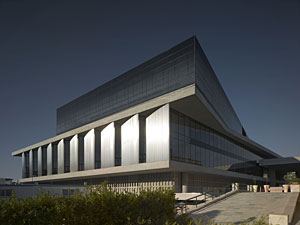 The New Acropolis Museum, Bernard Tschumi’s minimalist counterpoint to one of the world’s great archaeological sites, officially opens June 20, eight years after he won an international competition to design it, and three decades after the idea for a new Acropolis museum first surfaced.
The New Acropolis Museum, Bernard Tschumi’s minimalist counterpoint to one of the world’s great archaeological sites, officially opens June 20, eight years after he won an international competition to design it, and three decades after the idea for a new Acropolis museum first surfaced.
“The design was chosen for its simple, clear, and beautiful solution that is in accord with the beauty and classical simplicity of the museum’s unique exhibits,” says professor Dimitrios Pandermalis, president of the private organization overseeing the project. The original Acropolis museum, completed in 1873, will reopen as a gallery.
Tschumi’s challenge was to honor the historic importance of the site while accommodating the demands of contemporary Athens, with its hellish traffic, swarming tourists, and frequent seismic rumblings.
“People said, ‘You have to be contextual; it ought to be in the Doric style of traditional Greek temples,’” the architect recalls. “Forget it!” he answered. “You can’t do Doric as well as the ancient Greeks did it. Instead, I aimed for the same precision, the same clarity as the original temple.”
Tschumi’s museum is a three-story concrete, marble and glass trapezoid, topped by a canted glass rectangle containing sections of the original Parthenon frieze.
The first level, floating above the ruins of an ancient Athenian city, includes a lobby, temporary exhibition galleries, and retail spaces. A glass floor gives visitors close-up views of the excavated city, which was discovered in 2002 and forced major changes to the original design.
The second and third levels, connected by curving glass ramps, house the museum’s permanent collection of 4,000 objects from the Archaic to the Late Roman period, including many sculptures that once decorated the temples of the Acropolis. All are seen in natural light, as originally intended. Greek officials hope that the new museum will accelerate the return of other lost treasures, especially the fabled Elgin marbles that have resided in London’s British Museum since 1817.
The museum culminates in the glass-walled Parthenon Gallery, which Tschumi rotated 23 degrees to parallel the Parthenon itself, only 800 feet away. Here visitors can enjoy panoramic views that encompass Athens’ past and present, ancient history and modern.
At 226,000 square feet, the New Acropolis Museum provides ten times more exhibition space than its 19th century predecessor, while including a bar, restaurant, shop and other essential amenities for contemporary museums. Total construction costs approached $175 million, a huge investment that officials hope will pay off not only in increased tourism but also in the reclamation of Greece’s cultural patrimony.
Post a Comment